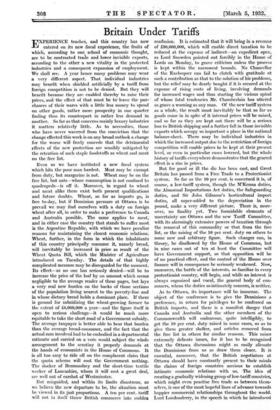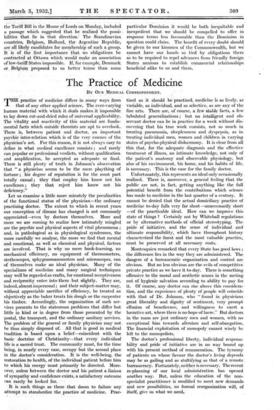Britain Under Tariffs
EXPERIENCE teaches, and this country has now entered on its new fiscal experience, the fruits of which, according to one school of economic thought, are to be contracted tilt& and lower invisible exports, according th the other a new vitality in the protected industries and a consequent expansion of employment. We shall see. A year hence many problems may wear a very different aspect. That, individual industries may benefit when shielded artificially by a tariff from foreign competition is not to be denied. But they will benefit because they are enabled thereby to raise their prices, and the effect of that must be to-leave the par- chasers of their wares with a little less money to spend on other goods, rather more prosperity in one quarter finding thus its counterpart in rather less demand in another. So far as that concerns mainly luxury industries it matters relatively little. As to necessities, those who have never wavered from the conviction that the change effected this week is on any broad outlook a change for the worse will freely concede that the detrimental effects of the new protection arc sensibly mitigated by the retention of such staple foodstuffs as wheat and meat on the free list.
Even so we have instituted a new fiscal system which hits the poor man hardest. Meat may be exempt from duty, but margarine is not. Wheat may be on the free list, but oats—whose consumption is not confined to quadrupeds—is off it. Moreover, in regard to wheat and meat alike there exist both present qualifications and future doubts. Wheat, so far as imports go, is free to-day, but if Dominion pressure at Ottawa is to prevail we may find ourselves with a duty on foreign wheat after all, in order to make a preference to Canada and Australia possible. The same applies to meat; and in either case the country that stands to suffer most is the Argentine Republic, with which we have peculiar reasons for maintaining the closest economic relations. Wheat, further, in the form in which the inhabitants of this country principally consume it, namely bread, will inevitably be increased in price as result of the Wheat Quota Bill, which the Minister of Agriculture introduced on Tuesday. The details of that highly complicated measure may be disregarded for the moment. Its effect—as no one has seriously denied—will be to increase the price of the loaf by an amount which seems negligible to the average reader of these pages, but lays a very real new burden on the backs of those sections of the population living nearest to the poverty-line and in whose dietary bread holds a dominant place. If there is ground for subsidizing the wheat-growing farmer to the extent of £6,000,000 a year—and the figure itself is open to serious challenge—it would be much more equitable to take the short road of a Government subsidy. The average taxpayer is better able to bear that burden than the average bread-consumer, and the fact that the actual sum involved had to be embodied in a departmental estimate and carried on a vote would subject the whole arrangement to the scrutiny it properly demands at the hands of economists in the House of Commons. It is all too easy to ride off on the complacent claim that the quota scheme will cost the Government nothing. The docker of Bermondsey and the short-time textile worker of Lancashire, whom it will cost a great deal, arc well out of earshot of Westminster.
But misguided, and within its limits disastrous, as we believe the new departure to be, the situation must be viewed in its just proportions. A ten per cent, tariff will not in itself throw British commerce into sudden
confusion. It is estimated that it will bring in a revenue of /130,000,000, which will enable direct taxation to be reduced at the expense of indirect—an expedient open, as Lord Snowden pointed out forcibly in the House of Lords on Monday, to grave criticism unless the -process is kept within the narrowest bounds. No Chancellor of the Exchequer can fail to clutch with gratitude at such a contribution as that to the solution of his problems, but the relief may be dearly bought if it is secured at the expense of rising costs of living, involving demands for increased wages and thus starting the vicious spiral of whose fatal tendencies .Mr. Chamberlain has utteied as grave a warning RS any man. Of the new tariff system as a whole, the result Must inevitably be that so far• as goods come in in- spite of it internal prices will be raised, and so far as they arc kept out there will be a serious loss to British shipping and a further fall in those invisible exports which occupy so important a place in the national balance-sheet: There may 'be individual industries in which the increased outputdue to the restriction- of foreign competition will enable prices to be kept at their present level, or even in particular cases lowered, but the whole history of tariffs everywhere demonstrates that the general effect is a rise in prices.
But for good or ill the die has been cast, and Great Britain has passed from a Free Trade to a Protectionist system. So far as the 10 per cent, is concerned it is, of course, a low-tariff system, though the M'Kenna duties; the Abnormal Importations Act duties, the Safeguarding duties, and Sir John Gilmour's horticultural import duties, all super-added to the depreciation in the pound, make a very different picture. There is, more- over, no finality yet. Two formidable elements of uncertainty are Ottawa and the new Tariff Committee, with its alarmingly extensive powers of taxation through the removal of this commodity or that from the free list, or the raising of the 10 per cent, duty on others to some new and arbitrary figure. Such -changes can, in theory, be disallowed by the House of Commons, but in nine eases out of ten at -least the Committee will have Government support, so that opposition will be of no practical effect, and the control of the House over fmance will in consequence be seriously weakened. Now, moreover, the battle of the interests, so familiar in every protectionist country, will begin, and while an interest is always organized and vocal, the general body of con- sumers, whom the duties so intimately concern, is neither.
As to Ottawa, its importance will be immense. The object of the conference is to give the Dominions preference, in return for privileges to- be conferred on British imports, and there is a manifest danger that Canada and Australia and the other members of the Commonwealth will endeavour, quite intelligibly, to get the 10 per cent. duty raised in some cases, so as to give them greater shelter, and articles removed from the free list in others for similar reasons. ' This raises extremely delicate issues, for it has to be recognized that the Ottawa discussions might as easily alienate the Dominions from us as draw them closer. It is essential, moreover, that the British negotiators at Ottawa should have constantly present to their minds the claims of foreign countries anxious to establish intimate economic relations with us. The idea of creating a gradually widening group of low-tariff countrieS, which might even practise free trade as between them- selves, is one of the most hopeful lines of advance towards happier commercial relationships throughout the .world. Lord Londonderry, in the speech in which he introduced the Tariff Bill in the House of Lords on Monday, included a passage which suggested that he realized the possi. bilities that lie in that direction: The Scandinavian countries x gelgium,. Holland, the Argentine Republic, are all likely candidates for membership of such a group. It is of the first importance that no obligations be• contracted at Ottawa which would make an association of low-tariff States impossible. If, for example, Denmark or Belgium proposed to us better terms than some particular Dominion it would be both inequitable and inexpedient that we should be compelled to offer in response terms less favourable than the Dominion in question could claim. The benefit of every. doubt should be given to our kinsmen of the Commonwealth, but we cannot have our hands so tied by obligations there as to be required to repel advances from friendly foreign • States anxious to establishcommercial relationships beneficial alike to us and them.



















































 Previous page
Previous page